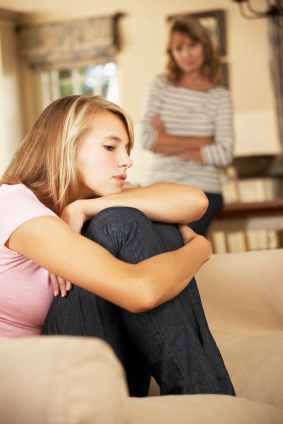Scott Stossel's account of surviving his lifelong struggle with crippling anxiety created a stir in one of my parent groups recently. In the article, Stossel traces a pattern of anxiety through several generations of his family and concludes that it is, at least in part, a biological "family trait." This made the parents in the room, well, anxious. Can anxiety really be inherited? Could they have unwittingly passed along an "anxiety gene" to their children? Isn't anxiety more of an environmental phenomenon, produced, or at least heavily influenced, by Type A, perfectionist over-parenting? Finally, given the current state of the world, isn't anxiety adaptive; that is, doesn't it make sense to be a little bit anxious?
This made the parents in the room, well, anxious. Can anxiety really be inherited? Could they have unwittingly passed along an "anxiety gene" to their children? Isn't anxiety more of an environmental phenomenon, produced, or at least heavily influenced, by Type A, perfectionist over-parenting? Finally, given the current state of the world, isn't anxiety adaptive; that is, doesn't it make sense to be a little bit anxious?
The short answer, to all of the above, is "yes." Most experts believe that there is almost certainly a genetic component to anxiety, though environmental factors play a huge role in determining if a child does in fact, become anxious. It can be inherited in two ways. Some infants are born acutely sensitive to auditory, visual and sensory stimuli. Jerome Kagan and his colleagues at Harvard later discovered that many of these "highly reactive" infants displayed greater fear and apprehension when confronted with new situations than their "low reactive" peers. As a result, they are often described as infants with an "anxious temperament." It is estimated that 15 to 20% of all children are born with this hereditary propensity to anxiety.
In addition, multiple studies have demonstrated that infants can "inherit" anxiety from their mothers in utero. Women under stress (Stossel's mother suffered two miscarriages and had difficulty getting pregnant again; other research has studied pregnant mothers in "war zones" produce more cortisol, the "stress hormone." Cortisol is transmitted through the placenta to the developing fetus, and stressed mothers are more likely to have infants who are highly reactive, with less ability to soothe themselves.
This is not to say that all babies born with a highly reactive temperament or to stressed mothers are destined to become anxious. The childrearing environment is a hugely powerful factor in determining if a child's propensity for anxiety (or almost any other inherited quality) is exacerbated or soothed. Some anxious babies are blessed with mellow parents, and others learn how to respond to these babies in a way that constitutes a "goodness of fit" between parental care and the child's temperament. As a child-parent therapist, I am always impressed by how quickly most parents can learn to how to understand and modify their behavior to soothe a "highly reactive" baby. These interventions can have lasting, long term effects, as we now know that relationships can change the way the brain is wired.
But in my experience, "highly reactive" infants can often make their parents anxious. They are more likely to cry and startle easily, and a disproportionate number of them suffer colic. To a new mother, an anxious baby can appear inconsolable, a daunting responsibility. This produces an environment in which both mother and baby are anxious, escalating the infant's already highly reactive responses, and further confounding the mother. A perfect storm of nature and nurture.
The good news is that researchers are discovering that anxiety is not wholly a bad thing. After all, a certain amount of anxiety can be highly motivating. Stossel cites research indicating that anxiety may be linked to higher levels of overall intelligence, and in conjunction with higher intelligence, productivity, creativity, and certain aspects of leadership. A recent study by Corinne Bendersky at UCLA's Anderson School of Management discovered that "neurotic" MBA students were motivated by anxiety to work harder on behalf of the group than "extroverts." The lesson for managers, according to Bendersky? Staff a team with "more neurotics."
And then there is Stossel himself. As editor of The Atlantic, he has obviously learned how to manage the "twitchy bundle of phobias, fears and neuroses" that constitute his personality. Perhaps more to the point, despite the often intolerable anxiety he describes, he wouldn't give it up. At 45, he's come to understand that it is an essential part of his being, even wondering if anxiety "may be a gift -- or at least the other side of a coin I ought to think twice about before trading in."
To my mind, this is the most interesting point of Stossel's excellent article. While no parent would wish an anxious temperament or environment for any child, it is worth pointing out that the worst of our personality traits also often constitute the best of us. Yes, anxiety can produce stage fright, phobias, irrational fears and hypochondria. At debilitating levels, it's imperative to get treatment to minimize the symptoms. But it can also produce motivation, curiosity, focus and diligence. As parents, it is important to remember these positives, so we don't focus only on attempts to contain or eradicate traits like anxiety.
So in addition to treating unhealthy levels of anxiety, don't forget to appreciate, and even more importantly, teach your child to appreciate the other side of the coin. It will help him understand, value, and ultimately manage aspects of his personality that might otherwise appear "bad" or negative. This will go a long way in helping him learn how to put them to good use.